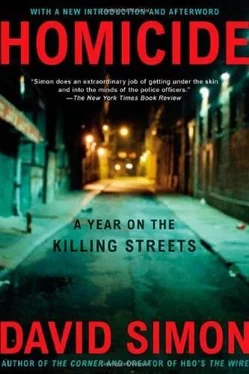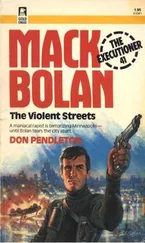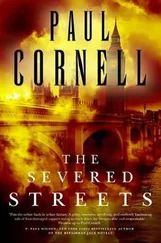Garvey keys the mike again. “Yeah, we’re in your district and we’re gonna need uniforms for a paper,” he says, “and also a DEU at Calhoun and, ah, Lexington.”
“Ten-four. When do you need them?”
Unbelievable. Garvey suppresses an impulse to ask if the weekend after Labor Day is convenient for everyone involved.
“We need them as soon as possible.”
“Ten-four. What’s your ten-twenty again?”
“Calhoun and Lexington.”
“Ten-four.”
Garvey returns the radio mike to its metal retainer and settles back into the driver’s seat. He slips a pair of wide-framed glasses down the bridge of his nose, then begins rubbing his dark brown eyes with one thumb and forefinger. The glasses are an incongruous accessory. Without them, Garvey looks like a Baltimore cop; wearing them, he looks for all the world like the proper businessman his father wanted him to be.
Garvey’s appearance is, on the whole, decidedly corporate: dark blue suit, blue dress shirt, a necktie of red and blue Republican stripes, well-shined Bostonians-a businessman’s ensemble made whole by the addition of a dark brown briefcase that travels between home and office, crammed with files and reports. Tasteful, nondescript, the clothes cover a tall but well-proportioned frame that is at first glance equal to the wardrobe in its ordinariness. Like his body, the detective’s face is long and thin, with a well-trimmed mustache and high forehead that ascends to a carefully combed crop of thinning black hair.
Except for the small lump that a.38 revolver produces on the back of one hip, Garvey fairly reeks of sales manager or, on a day when his blue pinstripe suit has been deployed, vice president for marketing. At first encounter, an untutored visitor to the homicide office might reasonably mistake Garvey for something from the police department’s planning and research department, a middle-management type who at any moment will begin pulling flow charts and quarterly projections from his briefcase, explaining that domestics and robbery shootings are down, but drug-related futures will continue to ascend through the last quarter. This image would shatter, of course, at the very moment Mr. Clean opens his mouth and emits the usual station house effluence. For Garvey, as for nearly all of the detectives in the unit, obscenities roll off the tongue in that practiced, fucking-this-motherfucker cadence that becomes, against a backdrop of violence and despair, a kind of strange poetry.
“Where are these motherfucking uniforms?” Garvey says, replacing his glasses and looking in both directions on Calhoun. “I don’t want to spend all fucking day hitting this house.”
“Sounded like you fuckin’ had to wake that goddamn dispatcher up,” Kincaid says from the passenger seat. “Now he’s trying to wake up some other poor motherfucker.”
“Well,” says Garvey, “a good police officer is never cold, tired, hungry or wet.”
The Patrolman’s Creed. Kincaid laughs, then jerks open the passenger door and pushes himself up and out to stretch his legs on the sidewalk. Two more minutes pass before one radio car, then another, then a third, pull behind the Cavalier. Three uniforms gather on the corner, conferring briefly with the detectives.
“Anybody here know where your DEU is today?” asks Garvey. It would help to have the district drug enforcement unit around in the event the raid produces dope for the simple, selfish reason that submitting narcotics to evidence control, even in small quantities, is a pain-in-the-ass process.
“Dispatch said they won’t be available,” says one officer, the first to arrive at the intersection. “Not for an hour or so.”
“Fuck it then,” says Garvey. “But that means somebody here is going to have to submit whatever drugs we find in there.”
“So let’s not find any,” says the first officer’s side partner.
“Well, I wanna take it if it’s there, just to have something on the guy,” says Garvey. “Normally, I wouldn’t care-”
“I’ll take the dope,” says the second patrolman. “I gotta run by headquarters anyway.”
“You’re a gentleman and a scholar,” says a third uniform, smiling. “I don’t care what them other guys say about you.”
“Which house is it?” asks the first officer.
“Fifth house in. North side of the street.”
“Three-seven?”
“Yeah, one family in there. Mother, daughter and a young boy named Vincent. He’s the only one we might have to worry about.”
“Is he getting locked up?”
“No, but if he’s there, he’s going downtown. We’re here for search and seizure.”
“Gotcha.”
“Which one of you is taking the back of the house?” Garvey asks.
“I got the back.”
“Okay, then you two go in the front with us.”
“Uh-huh.”
“Let’s do it.”
And then the district men are back in their cars, wheeling around the corner and onto Fayette. The first car rolls around the block and into the back alley that leads to the rear of the rowhouse; the other two screech to a halt in front of the stoop, with the Cavalier in between. Garvey and Kincaid race the younger patrolmen up to the marble stoop.
If this were an arrest warrant, if Vincent Booker were now charged with the murders of his father and Lena Lucas, the detectives would be wearing their vests, their guns drawn, and the front door to Vincent’s home would be answered on the first knock or it would come down hard under a steel maul or patrolman’s boot. So, too, would the raid be an act of controlled violence if the warrant had been written by a narcotics detective. But at this moment there is no reason to think Vincent Booker will play the role of desperado. Nor is the evidence sought in this warrant likely to be swallowed or flushed down a toilet.
Loud knocking brings a young girl to the door.
“Police. Open up.”
“Who’s there?”
“Police officers. Open this door now.”
“What you want here?” asks the girl angrily, opening the door halfway. The first uniform pushes the door full open and a crowd rushes past the girl.
“Where’s Vincent?”
“Upstairs.”
The uniforms race up the center steps to meet a lanky, wide-eyed young man at the second-floor landing. Vincent Booker says nothing and takes the handcuffs without protest, as if he long ago readied himself for this moment.
“What you want to arrest him for?” shouts the girl. “You supposed to be arresting the man done killed his father.”
“Calm down,” says Garvey.
“Why you lockin’ him up?”
“Just take it easy. Where’s your mother?”
Kincaid gestures toward the middle room on the first floor. The matriarch of the Booker clan is a fragile, diminutive woman sitting in one corner of a worn, flower-print sofa. She is watching beautiful people coupling and uncoupling on a black-and-white television. Against the background noise of a soap opera, Garvey introduces himself, shows the warrant and explains that Vincent is going downtown.
“I don’t know nothing about all that,” she says, waving the paper away.
“This just says that we can search the house.”
“Why you want to search my house?”
“It’s here in the warrant.”
The woman shrugs. “I don’t see why you got to search my house for anything.”
Garvey gives up, leaving a target copy on an endtable. Upstairs, in Vincent Booker’s room, drawers are jerked open and mattresses upended. By now, Dave Brown, the primary on the Booker murder, has arrived, and the three detectives move slowly, methodically, through the room. Brown guts the boy’s dresser as Garvey begins pushing each ceiling tile upward, probing for any objects hidden above. Kincaid takes apart the closet, pausing only to leaf through a skin magazine hidden on the top shelf.
Читать дальше












